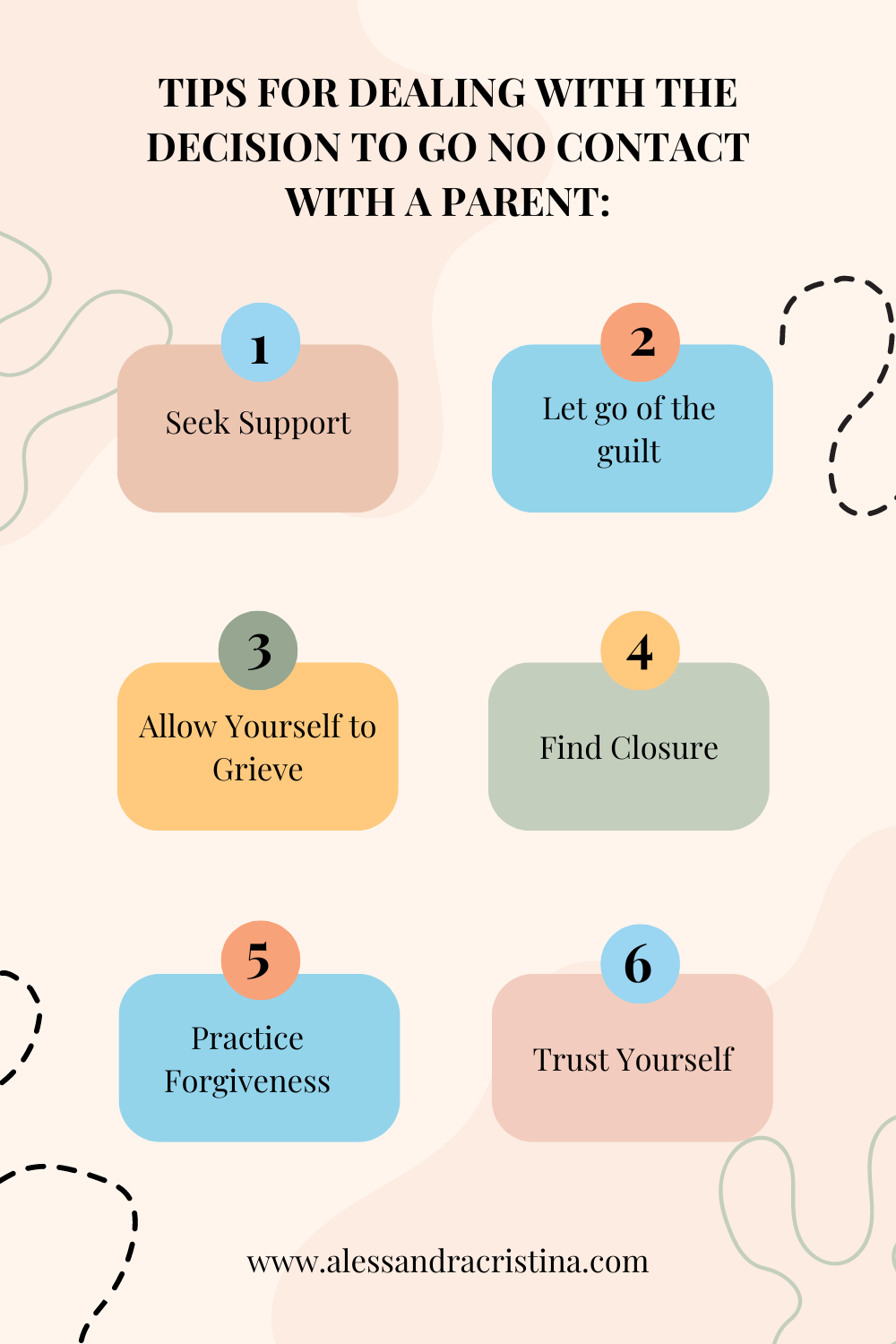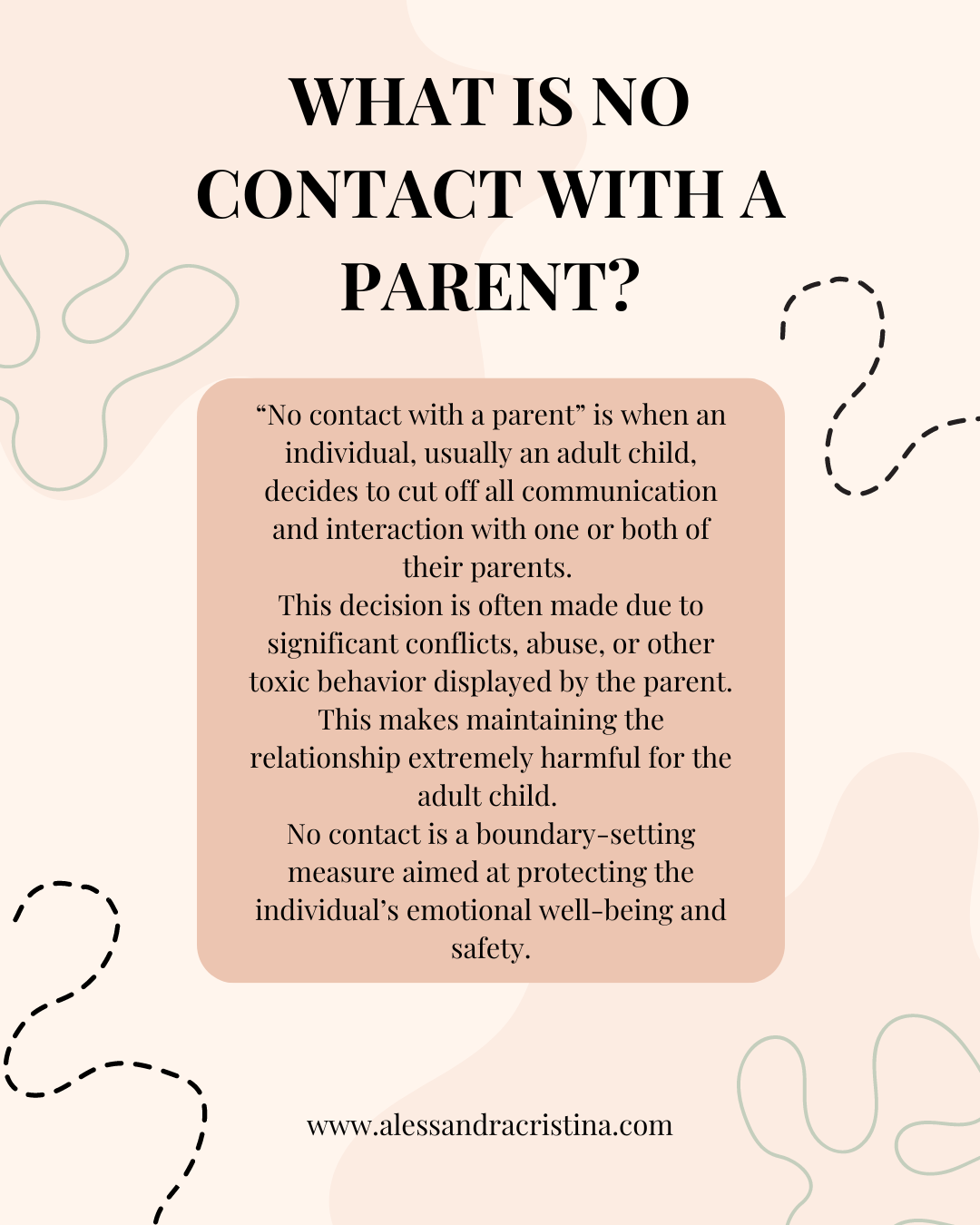Going no contact with a parent is the last thing an adult child ever wants to do.
If you grew up in a religious Hispanic household, disowning family members, especially a parent, is considered a forbidden act, a taboo. “Always honor both your parents” was something taught from an early age. You should always be indebted and grateful to them, regardless of any emotional, physical, mental, or spiritual pain they might have caused you growing up.
But what happens when the pain caused by a parent becomes too unbearable, too deep, too painful to continue the dysfunctional relationship? What do you do in that situation? Do you keep on enduring the abuse or do you walk away, even if it’s one of the most painful decisions you will ever make?
Deciding to go no contact with a parent is not a decision made lightly. In fact, it is one of the most heartbreaking things an adult child will ever have to do.

What is No Contact with a parent?
“No contact with a parent” is when an individual, usually an adult child, decides to cut off all communication and interaction with one or both of their parents. This decision is often made due to significant conflicts, abuse, or other toxic behavior displayed by the parent. This makes maintaining the relationship extremely harmful for the adult child. No contact is a boundary-setting measure aimed at protecting the individual’s emotional well-being and safety.
Adult children of emotionally immature parents often end up carrying their parents’ burdens as their own due to cultural and family dynamics. Embarking on my healing journey opened my eyes to the truth about our relationship: there was no father-daughter relationship. It was simply an obligation because of the way I was raised.
My experience with going no contact with my father
I had lived with my father for the first decade of my life. But after my parents came to the States to pursue a better life, they separated, and I never lived with him again. My father failed to form a bond with me after the divorce. And as time went by, the love and attachment I had for him started to disappear due to psychological abuse. I spent almost two decades convincing myself that it was normal not having a close relationship with him because the women in my family also had estranged relationships with their fathers.
But honestly, it wasn’t normal. At least, not in my eyes. To me, it seemed like the generational father’s wound had been passed down from my great grandmother, to my grandma, to my mother, and all the way down to me. That’s why I decided to put an end to it and no longer be identified by it. I refused to have a relationship with a family member just out of obligation.
When I first made the decision to go no contact with my father, I experienced all different emotions. But setting up a boundary allowed me to have my life back. For once, I was in full control of my own life and was no longer living by the expectations of others. Of course, alongside feeling empowered by my decision, feelings of shame and guilt overwhelmed me. “Was I doing the right thing? Am I a terrible person? What happens if he dies or harms himself because of my decision?” Those were some of the thoughts that constantly haunted me.
Going no contact with my father wasn’t just about cutting ties; it was about reclaiming my power and setting boundaries. It was about putting myself first and prioritizing my own happiness and well-being, regardless of the opinion of others. And though the journey was extremely painful, it ultimately led me to a place of peace and self-acceptance.
Tips for dealing with the decision to go no contact with a parent:
- Seek Support: Surround yourself with understanding friends, family, or a therapist who can offer emotional support during this painful time.
- Set Boundaries: Clearly communicate your boundaries to your parent and stick to them.
- Let go of the guilt: Cutting off a parent is a huge decision, but your responsibility is first to your yourself and your well-being.
- Practice Self-Care: Make self-care a priority to manage emotions and reduce stress.
- Allow Yourself to Grieve: Recognize that it’s okay to mourn the loss of the relationship, even if it’s necessary.
- Stay Firm: Stay committed to your decision, even if others try to persuade you otherwise.
- Create Distance: Surround yourself with supportive people and limit contact with those who may guilt-trip you.
- Find Closure: Seek closure within yourself through writing, journaling, or therapy.
- Practice Forgiveness: Work towards forgiving your parent for your own peace of mind, without excusing their behavior.
- Trust Yourself: Trust your instincts and know that you’re making the best decision for your well-being.
A few months after I made the decision to cut my father out of my life, he passed away, and I wasn’t there to say goodbye. Emotionally, I had been grieving him in silence since I was a teen. I also made peace with my decision and forgave him because I owed it to myself. I came to the realization that forgiveness is never about the other person. It’s about freeing yourself from the chains of the past. I am grateful for him and the lessons he taught me in this lifetime. And I truly believe that his shortcomings allowed me to transform myself in the most positive way. To this day, I don’t regret anything. Though my heart aches for the little girl in me that was in love with her dad and lost him the day he came to this country.
If you’re going through something similar, know that you’re not alone. It’s okay to put your own well-being and mental health first. Your healing matters. You deserve to find peace and happiness, and to live free of pain no matter what anyone else says. Trust in your own strength, and know that brighter days lie ahead on the path to healing and self-love.

<3